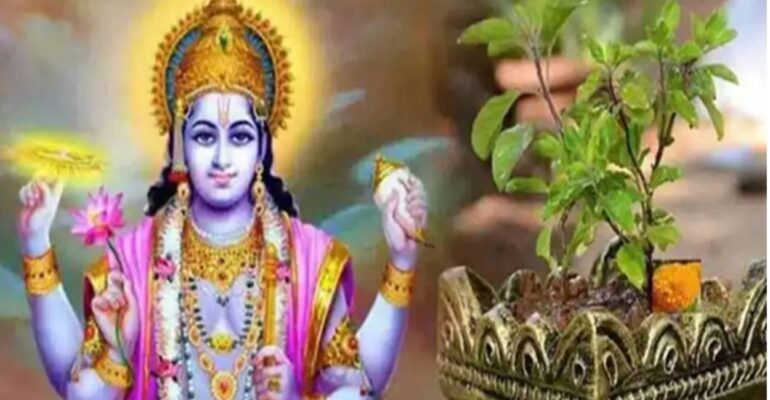According to Hindu beliefs, Lord Vishnu goes into a deep sleep (Yoga Nidra) on Devshayani Ekadashi (June/July) and awakens on Dev Uthani Ekadashi (October/November).
Dev Uthani Ekadashi 2025: Dev Uthani Ekadashi (also known as Prabodhini Ekadashi or Devotthan Ekadashi) is one of the most auspicious festivals in Hinduism. It marks the end of Lord Vishnu’s four-month cosmic sleep (Chaturmas) and the beginning of the wedding and festive season in India.
Meaning of Dev Uthani Ekadashi
“Dev Uthani” means ‘the awakening of the gods’.
“Ekadashi” means the 11th day of the lunar fortnight.
According to Hindu beliefs, Lord Vishnu goes into a deep sleep (Yoga Nidra) on Devshayani Ekadashi (June/July) and awakens on Dev Uthani Ekadashi (October/November).
During these four months (known as Chaturmas), auspicious activities such as weddings, engagements, and major religious ceremonies are suspended.
Dev Uthani Ekadashi marks the resumption of all auspicious and religious ceremonies – including the symbolic Tulsi-Shaligram Vivah (marriage of Goddess Tulsi and Lord Vishnu).
Spiritual Significance: This fast symbolizes devotion, self-control, and self-purification. Observing the fast is believed to bring salvation, peace, and prosperity.
Astrological Significance: It is one of the 24 Ekadashis of the year, considered the most fruitful for Vishnu devotees. True devotion is believed to destroy all sins. Dev Uthani Ekadashi Date and Auspicious Time
Ekadashi Tithi Begins: November 1, 2025 – 09:11 AM
Ekadashi Tithi Ends: November 2, 2025 – 07:31 AM
Parana Time (Time to break the fast): After 07:31 AM on November 2
Best Muhurat for Puja: November 1, 08:00 AM – 10:30 AM
(Dates may vary slightly depending on location and local sunrise/sunset times.)
Religious Significance of Dev Uthani Ekadashi
It symbolizes the awakening of divine energy in the universe.
From this day onwards, all auspicious activities such as weddings, engagements, housewarmings, and pilgrimages can be resumed.
It also emphasizes spiritual awakening – reminding humans to rise above ignorance and rekindle their faith.
Main Rituals of Dev Uthani Ekadashi
Fasting and Prayers
Devotees observe the Ekadashi fast, abstaining from grains, rice, and heavy meals.
They worship Lord Vishnu and Goddess Lakshmi with Tulsi leaves, incense sticks, lamps, and devotional songs. Tulsi Vivah
On this day, devotees perform a symbolic marriage ceremony of Tulsi (holy basil) with Lord Vishnu (in the form of Shaligram).
This marks the beginning of the Hindu wedding season.
Dev Uthani Ritual
A symbolic act of awakening Lord Vishnu:
Devotees chant hymns like “Utho Deva Utho” (Awaken, O Lord).
They offer flowers, sweets, and blow conch shells to symbolize the awakening.
Spiritual Message of Dev Uthani Ekadashi
The awakening of Vishnu represents the revival of righteousness and balance in the world.
It teaches that spiritual growth is cyclical – awakening (action) followed by rest (introspection).
This day inspires devotees to rekindle discipline, compassion, and devotion in their lives. Festivities Across India
North India (UP, Bihar, Rajasthan)
Tulsi Vivah is celebrated in temples and homes with rituals and decorations.
Maharashtra and Gujarat
It is known as Dev Uthani Gyaras – people make decorative clay beds for Lord Vishnu.
South India
Devotees celebrate Utthana Dwadashi with fasting and Vishnu Puja.
Vrindavan and Mathura
Grand celebrations symbolizing the divine union of Tulsi and Vishnu are held in prominent temples.
Traditional Greetings
“On this Dev Uthani Ekadashi, may Lord Vishnu awaken happiness, prosperity, and peace in your life.”
“On Dev Uthani Ekadashi, let us awaken devotion and perform good deeds as the deities awaken.”
“Happy Dev Uthani Ekadashi – May your life be filled with divine light and renewed energy.”

